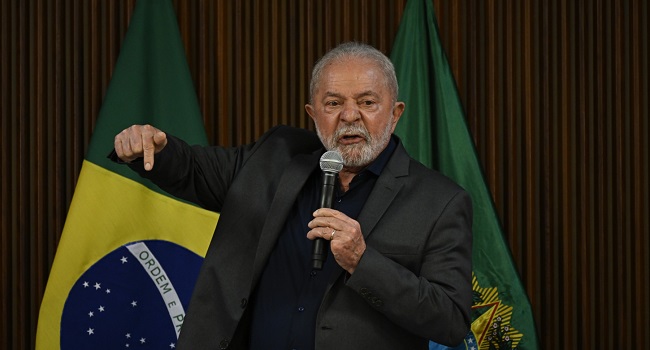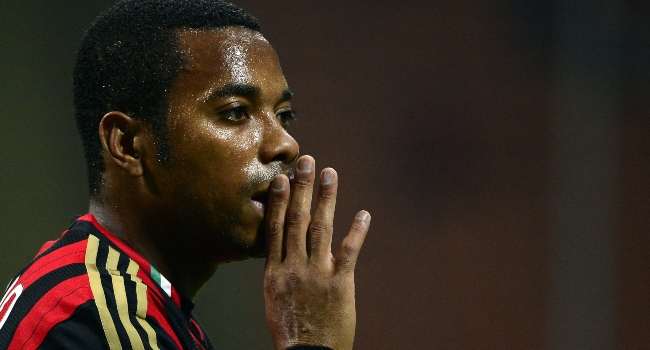President Luiz Inacio Lula da Silva sacked the commander of Brazil’s army Saturday, two weeks after an election-denying mob loyal to his far-right predecessor ransacked the halls of power in Brasilia.
The veteran leftist’s dismissal of Julio Cesar de Arruda came a day before Lula was to make his first trip abroad — to Argentina — as he moves to put the South American powerhouse back on the international stage.
READ ALSO: Six More Classified Documents Found In Biden’s Home
Arruda had only taken up the post on December 30, two days before the end of outgoing president Jair Bolsonaro’s term, and was confirmed by Lula’s administration in early January.
On January 8, Bolsonaro supporters ransacked the presidential palace, Supreme Court and Congress in Brasilia, breaking windows and furniture, destroying priceless works of art, and leaving graffiti messages calling for a military coup.
Lula has said he suspects security forces may have been involved in the riots, in which more than 2,000 people were arrested. The leftist president announced a review of his immediate environment.
Defense Minister Jose Mucio said Saturday evening after meeting with the president that Arruda was out as head of the army because of “a break in the level of confidence.”
“We thought we needed to stop this in order to get over this episode,” Mucio said, alluding to the attack in Brasilia.
Mucio said Friday after a meeting with Lula and the chiefs of the three branches of the military that there was no direct armed forces involvement in the riots.
On Wednesday, the man named to be the new army chief, Tomas Ribeiro Paiva, until now the head of the southeastern army command, vowed that the military “will continue to guarantee democracy.” And he suggested that the results of the October election in which Lula defeated Bolsonaro should be accepted.
On Sunday Lula will head to Argentina, the customary first stop for Brazilian presidents. Beyond tradition, however, the trip will also allow him to meet with a faithful ally, President Alberto Fernandez, as well as regional counterparts at the summit of the Community of Latin American and Caribbean States (CELAC).
“Everyone wants to talk to Brazil,” Lula said this week in an interview with the Globo TV channel, promising to rebuild Brasilia’s ties with the international community after Bolsonaro’s four years in office were marked by international isolation for the country.
Latin America is only the initial phase of his international push, with German Chancellor Olaf Scholz paying a visit on January 30, and Lula headed to Washington to meet with his US counterpart Joe Biden on February 10.
Lula’s priority is to “reconnect with Latin America” after ties with neighbors in the region were “relegated to the backburner,” Joao Daniel Almeida, a foreign relations specialist at Pontifical University in Rio de Janeiro, told AFP.
Lula arrives in Buenos Aires on Sunday and will meet with Fernandez the following day. The center-left Argentine leader has already traveled to Brazil for a bilateral meeting, held on January 2, the day after Lula took office.
Discussion is expected to include trade, science, technology and defense, Brazil’s foreign ministry said.
Pink tide
Brazil’s 77-year-old leader could also meet several leftist counterparts on Tuesday in Buenos Aires — Cuba’s Miguel Diaz Canel and Venezuela’s Nicolas Maduro, with whom Brasilia has recently normalized ties — who will all be attending a regional summit.
Under Bolsonaro, Brazil was one of fifty countries that recognized Maduro’s main opponent, Juan Guaido, as interim president of the country.
In Buenos Aires, the CELAC summit aims to bring together more than 30 states from the region. Lula, who served two previous terms as president from 2003 to 2010, was one of the founders of the group, formed when a so-called “pink tide” of left-leaning governments washed over Latin America.
With a number of leftist leaders having recently come to power, the region’s constantly see-sawing political map once again resembles that of the early 2000s.
Bolsonaro, a harsh critic of the left, suspended Brazil’s participation in CELAC, alleging the body “gave importance to non-democratic regimes such as those of Venezuela, Cuba and Nicaragua.”
He also failed to establish warm ties with Argentina, Bolivia, Chile and Colombia, where the left had come to power.
Foreign relations specialist Almeida said that Lula wants to “prioritize economic cooperation” in the region.
Lula also expressed this week his interest in a regional policy for the preservation of the Amazon, as the international community waits with bated breath for changes following Bolsonaro’s strong record of increased deforestation.




